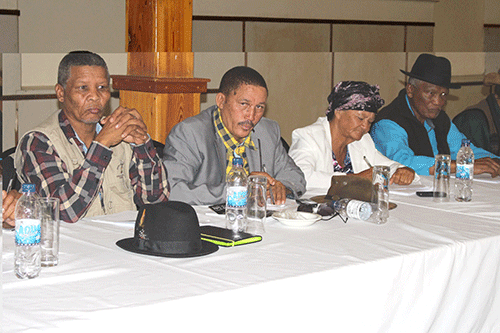KEETMANSHOOP – Efforts to list commercial public enterprises on the stock exchange will enjoy priority for Namibians to benefit from them by becoming shareholders.
This was the verdict of Louise Shixwameni, deputy executive director in the Ministry of Finance and Public Enterprises Department of Public Enterprises earlier this week during a stakeholders’ consultative meeting here.
Its aim was to solicit inputs on the draft Public Enterprises Ownership Policy (PEOP) of the Namibian state.
“When we gave it a try with Mobile Telecommunications Ltd (MTC), the public response was satisfactory, whereby over 5 000 people became shareholders, hence the need to extend it accordingly,” she noted.
Shixwameni said prospering in the Namibian economy is not all about having a job, but rather about how one can participate in opportunities like local procurement and manufacturing.
“Public enterprises in this regard are key accelerators for development in countries coming out of colonialism,” she reasoned.
The deputy executive director also bemoaned the fact that 90% of the Namibian economy is owned by less than 15% of its population.
“This, and also the fact that most of the big retailers in the country have headquarters based in South Africa, created the need for a strong local business-owned economy,” she emphasised.
There is, thus, a need to implement a policy reforming public enterprises as a measure to eradicate backlogs in citizens benefitting from developmental opportunities.
In her keynote address, //Kharas governor Aletha Frederick said public enterprises play a significant role in the country’s economy, contributing to growth, employment creation and the provision of essential services.
“As a result, they constitute a key part of our national life and our national assets, making them central to our developmental and economic agenda,” she added.
Frederick said: “It is imperative that we have a well-defined ownership policy (PEOP) that ensures these entities operate efficiently, transparently and in the best interest of the public. Consequently, the reform of public enterprises forms part of a broader agenda of transformation in our country”.
She then commended the line ministry for conducting regional stakeholders’ consultation workshops across six regions of Namibia with the aim of discussing the policy and gathering inputs from diverse audiences.
The politician said by engaging in an open and constructive dialogue, stakeholders can collectively develop a robust ownership policy that addresses the challenges faced by public enterprises, while maximising their potential.
“This inclusive approach will enable us to develop a comprehensive ownership policy that reflects diverse viewpoints and fosters collaboration among all stakeholders,” she added.
Keetmanshoop mayor McDonald Hanse in his welcoming remarks said the policy is not only a roadmap for the nation’s economic development but also a tool for ensuring equitable resources’ distribution and stability.
“Engagements like this not only stimulate our minds but also enable us, as stakeholders, to make more informed decisions, which will result in maximum success,” he added.
Namibia currently owns 81 public enterprises.
The total asset value of commercial public enterprises stands at N$120 billion with liabilities of N$60 billion, whilst their net value assets are worth N$60 billion.
Public enterprises are currently providing employment to 25 000 workers.
– sklukowski@nepc.com.na



